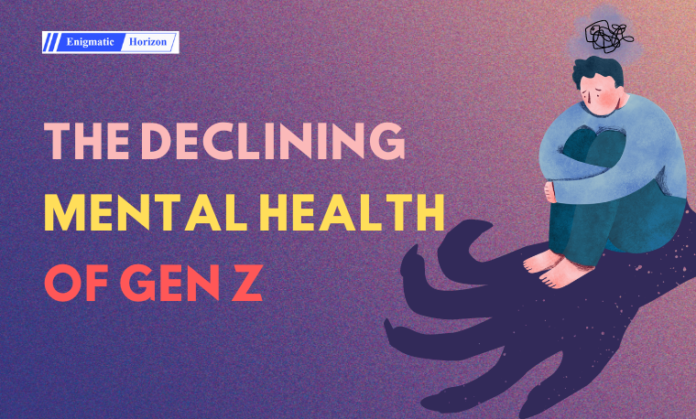Rinku Sharma
Those born between the mid-1990s and mid-2000s are referred to as “Generation Z” or “Gen Z.” This generation stands out because it is the first to have grown up in the digital era and has had greater exposure to social media and technology than any previous.
Sadly, there have been negative effects associated with this increased exposure to technology and social media. Compared to their older counterparts, Gen Z youths are more likely to have depressive, anxious, and suicidal thoughts. They spend far too much time on social media, which can make them feel alone, inadequate, and overburdened.
Reasons Behind Gen Z’s Mental Health Problems
For Gen Zers, there are a variety of possible causes for mental health problems. Several potential reasons include:
Social Media
Gen Z youths may experience anxiety, depression, and other mental health issues due to constant comparison to others, being subjected to unreasonable expectations, a fear of losing out, and an inability to disconnect from the virtual world. Social media’s increasing influence on Gen Z’s lives has contributed to an increase in mental health disorders.
A lack of direct communication
Because they spend more time online, Gen Zers are missing out on crucial in-person encounters, which can cause feelings of loneliness and isolation.
Absence of familial bond
Gen Z could suffer from a lack of communication with their families. As a result, family values and sentiments like love, empathy, shared interests, and understanding usually fade away. Working parents who don’t give their kids enough time to bond with them may raise emotionally troubled children. Kids will begin to bottle up their emotions and develop insecurities if they don’t have anybody to express their thoughts to or talk to about their day. Eventually, low self-esteem and trust issues may arise.
Absence of outdoor activities
Because of the Covid-19 situation, children are confined to their homes and are unable to play outside. As a result, they have swiftly learned to use electronic devices for purposes other than studying. They are becoming dependent on social media. The increasing use of technology has also led to the confinement of today’s young generation within themselves or just a few close friends. Children would prefer playing video games rather than going outside to play. This has further led to their loneliness, isolation, and lack of social interaction.
Addressing the mental health issues of Generation Z
It is crucial to address the needs of Gen Z youth with mental health issues. Here are some important things that could help address the mental health challenges of Gen Z.
Psychotherapy
Psychotherapy can aid in reducing or managing bothersome symptoms, allowing Gen Z to recover from mental conditions. Teenagers can develop better-coping mechanisms and learn to recognize, express, and manage their emotions through counseling sessions.
Lifestyle changes
Gen Z’s mental health concerns could be addressed by helping them change their lifestyle and adopt healthy decisions that support their mental health and encourage overall well-being. For young people with mental health conditions, lifestyle changes such as regular exercise, having a balanced diet, getting adequate sleep, and limiting screen time might be helpful. These measures can lessen stress, foster a sense of relaxation, and enhance general well-being.
Emotional support
An emotionally supportive environment could be created at home to provide the younger generation with a safe space to express and process all of their feelings. It also entails hearing their issues and providing assistance in resolving them. Helping youngsters connect with loved ones, friends, teachers, or other adults who can offer emotional support for overcoming challenges can help address their mental health issues.
Taking breaks
Taking a moment to spend some time alone will give Gen Z the time to reflect on themselves and understand why they are having certain feelings. Taking a mental break by engaging in activities like yoga, meditation, or cutting off from social media, among others, might be helpful to reduce stress, anxiety, and frustration.
Bottom line
Greater attention should be paid to the mental health issues of Gen Z. Parents should be willing to talk openly with their children about their mental health and be aware of the symptoms of mental health problems. Gen Z must be seen as a significant part of our society, with their distinct needs and challenges. It is the duty of families and teachers to educate teenagers about the importance of mental health, the symptoms of mental diseases, and the ways to overcome them.
